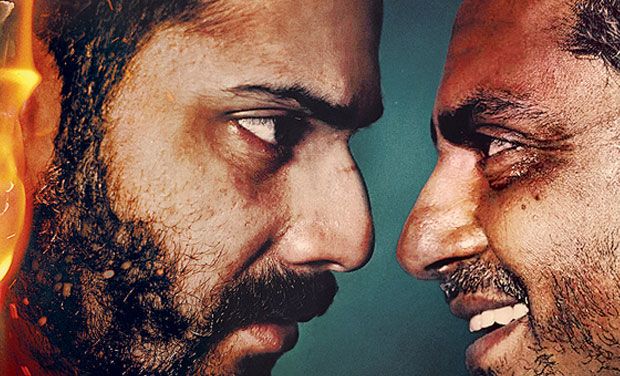By Subhash K. Jha
Film: “Badlapur”; Cast: Varun Dhawan, Nawazuddin Siddiqui, Huma Qureshi, Yami Gautam, Divya Dutta, Radhika Apte, Vinay Pathak; Director: Sriram Raghavan; Rating: ***1/2
“The tree remembers, the axe forgets,” reads a proverb in the opening credits of a film that left me feeling like both the tree and the axe.
While the film’s pain-lashed topography in the first overture is exceptional — with every vein on Varun Dhawan’s temples ringing a bell — the second overture gets audacious tongue-in-cheek, subversive and sometimes downright silly. As if the tree decided to get even with the axe by cutting off its own branches.
Cast in the mould of the greatest redemptive dramas “Badlapur” has an ambitious ambiance of unmitigated doom irrigating almost every frame. It’s as if director Sriram Raghavan and his co-writer Arijit Biswas wants to shut out all light from his protagonist Raghavan’s life.
Insulated from the outside world, Raghav’s festering pain spreads itself out in the narrative spanning a seductive facsimile of reality that jumps off the screen to claim our attention.
For a large part, “Badlapur” is an exceptionally engaging drama.
The film opens on a busy road in Pune with traffic, passersby, hawkers and bystanders loitering in camera range.
In a corner. we catch a mother and child heading into their family car. We don’t know yet that they are our hero Raghavan’s universe. We also don’t know that they will be dead in the next 10 minutes, and our hero would shed his heroic skin as the plot progresses from being a human drama to a heist caper with a loot that is quite a hoot.
The confrontational drama between the hero Raghavan and the villain Laik gets a massive, near-monumental fillip from the main actors.
Varun Dhawan, a bit raw around the edges but nonetheless acutely effective as the grieving family-man, and Nawazuddin, flawlessly flamboyant as the sly villain who has willy-nilly destroyed the hero’s life, together confer an overpowering immediacy to the proceedings.
But then, their collaborative might as the sinned and the sinner, begins to be dimmed by a digressive drama that impinges itself from the sidelines.
The virus of over-ambition strikes the narrative much in the same way that tragedy strikes Raghavan’s life.
The problem is with the structure. Raghavan cannot make a film without incorporating the heist element.
A bag filled with crores of money shows up in the second half to claim primacy as protagonist in the plot. So do two new characters played with panache by Vinay Pathak and Radhika Apte. Both are very effective in their parts. But they make no real sense out of the material that the script throws into their orbit.
There is a sequence where our hero, rapidly degenerating into a vengeful sociopath tells his wrong-doer that he will forgive him if Raghavan is allowed to sleep with his wrongdoer’s wife.
Raghavan and the wrongdoer’s wife proceed to the bedroom. What follows is unintentionally hilarious. There is a woman in a bra and lots of moaning sounds. But no sex.
Wait. There is sex elsewhere. The love-making sequence with Huma Qureshi who plays a prostitute and Laik’s girl is meant to be brutal but ends up being a burlesque of the real thing.
The sequences showing the hero using sex as a weapon of revenge don’t work not for the lack of intelligent writing. But because Varun’s inexperience shows up in sequences that expose his youth.
No such problems arise in Nawaz’s performance. Flawlessly cunning and diabolic, he goes from bank robbery to jail term to chronic escapee with a deep understanding of the humour that underlines all anti-social humour.
Rebellious minds can’t see how self centred their aspirations are. Nawazuddin can. He can peer into Laik’s murky soul and find redeemable humour. It’s a remarkable achievement, sadly not matched by all of the screenwriting in this engaging authentic but flawed drama of crime and retribution.
What director Sriram Raghavan avoids at any cost is shallowness in the dynamics of vendetta. The tussle of oneupmanship between Raghavan and Laik never lapses into an incoherent and angry jumble of rhetorics and recrimination. There is always room for the drama to slide open slippery doors that lead into unexpected truths about the quality of life lived on the edge of destruction.
It takes a social worker, played with empathetic energy by Divya Dutta to point out the sheer nullity of Raghavan’s life after the revenge would be complete. The same is true of the screenplay. It seeks its strength in the vendetta drama and then loses steam when the hero begins to lose his way in the maze of retribution.
Finally “Badlapur” leaves a lot to be desired.
Desire being one of the predominant themes in the revenge tale. A routine ‘Hero Versus Villain’ premise is uplifted by the stark and stripped-down central performances.
Nawaz and to an extent Varun bare the souls of their character. Varun falters due to inexperience but more than redeems himself in a sequence such as the one where he confesses to Nawazuddin about cold-bloodedly killing a couple.
It is that ruthlessness of the rootless, a man who has lost everything that Varun portrays with compassion.
The supporting is consistently brilliant. But then, that’s the least one expects from Raghavan’s film.
“Badlapur” takes the cinema of eye for an eye to a new high. The feral ferocious face-offs between Varun and Nawazuddin captured in the colour of wrath and doom by cinematographer Anil Mehta, confer a vital visceral velocity to the virile vendetta saga.
At the end, the darkness of despair gets to you.
I am not sure why I felt cheated and betrayed.
Was it because the protagonist didn’t get the revenge he expected? Or was it something else?




